After Superstorm Sandy-related reconstruction knocked out the gas line to several Red Hook West buildings in January, some tenants are seeking compensation for the disruption.
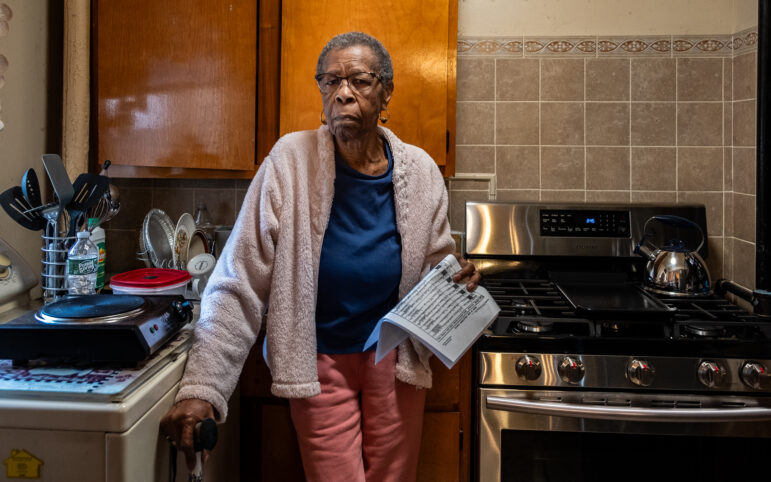
Adi Talwar
Agnes Winn, 91, in her kitchen at NYCHA’s Red Hook West Houses, where she’s lived since 1957. Winn and her apartment building neighbors have been without cooking gas since Jan. 24. NYCHA provided her with a single hot plate.Chanell Jackson returned to her home at the Red Hook Houses in Brooklyn on a recent Friday with McDonald’s in hand for her three children ages 5, 9 and 16.
But the fast food meal was not a treat to kick off the weekend. Rather, it was yet another substitute for a home-cooked meal because the kitchen gas in Jackson’s apartment hasn’t worked for over two months.
Bringing home prepared meals has become a daily occurrence, Jackson told City Limits. “A week, I’m paying maybe a little over a hundred [dollars],” she said.
Jackson’s family is among 113 households across four buildings at the Red Hook West Houses that have gone without kitchen gas since Jan. 24, when workers on a climate resiliency project struck a gas line.
Residents there are frustrated with the growing expense of take-out, the health risks associated with it, and the uncertainty as to when the gas will turn back on.
Jackson is currently withholding her rent in an effort to compel repairs. “If you want the rent money, then you have to fix the gas,” she said. Two other tenants told City Limits they are doing the same, one with support from the nearby Red Hook Community Justice Center (RHCJC).
It is difficult to know for sure how many tenants are withholding, RHCJC told City Limits. The organization urged residents who are testing this leverage to document evidence, potentially by filing a code enforcement case in housing court called an HP action.
“Residents are more reluctant to pay their rent due to repair conditions in their apartments,” Daren Sealey*, a program manager at RHCJC, told City Limits in an email. “This is frequently seen when there is a prolonged utility outage or hazardous repair conditions that [are] constantly being left on deaf ears at the management office.”
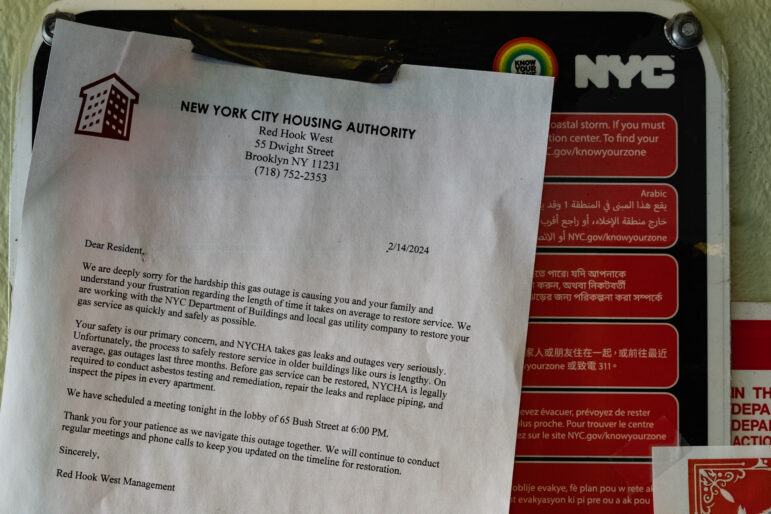
Adi Talwar
A letter about the gas outage in a NYCHA Red Hook West apartment building at 65 Bush St.The Red Hook West residents could also benefit from proposed state legislation that would lower the amount of rent NYCHA residents must pay during a utility outage.
Reached for comment, NYCHA said that it is working to resolve the service as soon as possible, but did not provide specifics.
This isn’t the first time tenants at the Red Hook campus have gone without gas: the development saw similar outages in 2021, 2018, and 2016, according to news reports at the time.
Despite some tenants withholding rent, NYCHA said that it has seen an increase in monthly rent collection at the Red Hook campus over the last year.
Collection at developments in Brooklyn overall has increased slightly from 61 percent in February 2023 to 65 percent in February 2024, according to NYCHA metrics. The housing authority said it advises tenants to continue paying rent and to visit the management office if there are any individual hardships preventing on-time payment.
Systemwide, around 70,000 NYCHA households owe back rent, officials testified to the City Council last month, an issue that’s worsened since the pandemic, when public housing tenants were locked out of the state’s initial round of COVID rent relief funds.
‘You become a camper’
Up close, the Red Hook Houses resemble a maze, boarded by chain-wire fences. Within it are excavated grounds, blocked-off walkways and drying cement. The ongoing construction work is part of a $550 million Hurricane Sandy resiliency project that broke ground in September 2017 and includes roof replacement as well as new plumbing and electrical systems.
The 40-acre campus, constructed in 1938, is among the 10 percent of NYCHA complexes damaged in the October 2012 superstorm. It is surrounded by waterways including the Erie Basin, Buttermilk Channel and Gowanus Canal.
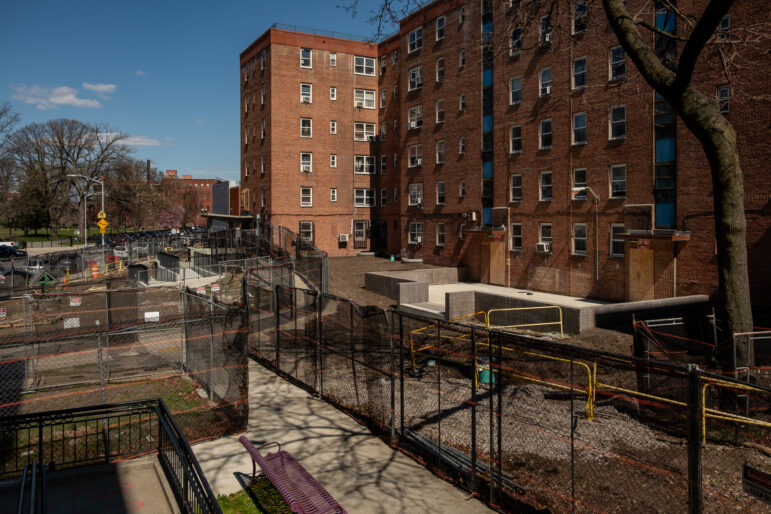
Adi Talwar
Residents have to navigate a maze of fenced walkways to get to NYCHA Red Hook West’s Management Office on 55 Dwight St.Power was out for more than two weeks, according to the website of Kohn Pedersen Fox Associates (KPF), an architecture practice that is working with NYCHA on the resiliency project.
Work is also underway to construct flood barriers and new power plants on both the east and west campuses, as well as a new generator system to heat the development.
Around 11:30 a.m. on Jan. 24, Andrea McKnight recalled hearing the sound of a cement truck rolling outside of her window and a “heavy” smell permeating her building.
Soon emergency vehicles were lined up across from her apartment at 495 Columbia St. Neighbors were downstairs waiting to hear updates on what had just happened. “They said one of the construction workers hit something,” McKnight recalled.
Her kitchen gas service was disrupted as a result. Ever since that January day, she’s been among the tenants trying to figure out alternative cooking methods.
“You become a camper trying to survive without the gas,” said McKnight. “Unless you have other electrical appliances, you’re not going to be able to cook an entire meal.”
NYCHA has provided affected residents with a hot plate—a portable electric cooktop to be used in lieu of a stove. But tenants are struggling with them, citing long cook times, and reporting few options for a healthy meal within walking distance.
“We have a lot of seniors now,” said McKnight. “A lot of them have walkers… it’s an unfair thing.”
Evaristo Garcia, whose mother lives at 493 Columbia St., said that with the single hot plate, preparing a full meal is a challenge.
“Yesterday, I had seven pieces of chicken and had to cook three pieces at a time in order for it to cook,” he said. “I started frying chicken around 8:30, I wasn’t done until like 10.”
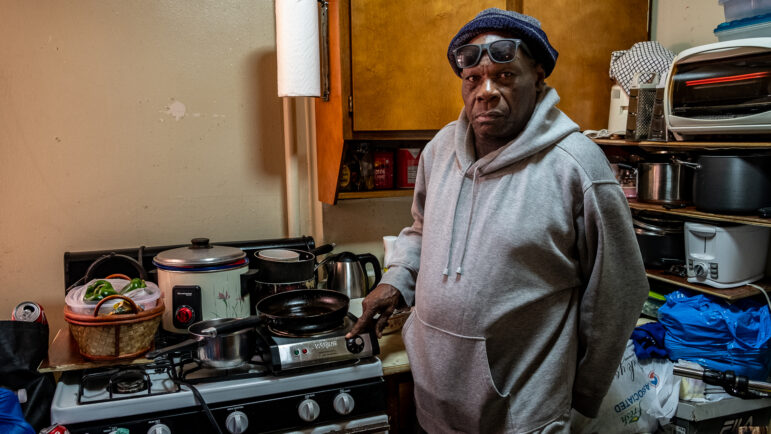
Adi Talwar
Thomas Lubrin, 75, in his NYCHA Red Hook West apartment kitchen, showing his NYCHA-provided hot plate.In a statement to City Limits, NYCHA said that gas service interruptions are a “matter of public safety” and require multiple steps to resolve, including “shutting off service, making necessary repairs, inspections and coordinating with service vendors.”
At the time of publication, 63 NYCHA campuses including Red Hook West were experiencing a gas outage, according to online records.
Agnes Winn is a 91-year-old Red Hook tenant who lives at 65 Bush St.. She takes pride in being able to care for herself, keeping a tidy apartment, preparing her own healthy meals and taking walks outside.
But since January, her routine has come with frustrations and an additional price tag. The lack of kitchen gas joins a list of eight other violations in her apartment, according to New York City Department of Housing and Preservation Development (HPD) records. At least three to four times a week, she spends money on a sandwich from a nearby deli.
“Sometimes I go out because I’m depressed here thinking about this stuff,” said Winn. “Then I’ll swing by to get something to eat. I eat too many sandwiches but I feel like it’s not enough nutrition for my body.”
Sealey at RHCJC has been knocking doors at Red Hook West to better understand tenants’ needs during the outage. While making his rounds, concerns about limited food options have come up frequently.
“In a way, they consider this neighborhood a food desert because they’re not able to provide those healthy food options,” said Sealey. “When you think about them having to order out more and you think about the timeline to restore the gas, dietary restrictions, healthy food options, all of those play a role in this form of inequality tenants are seeing living in public housing.”
Sealey has helped some tenants contact the city’s Human Resources Administration to request a restaurant allowance of $23 per month. Residents must reapply each month.
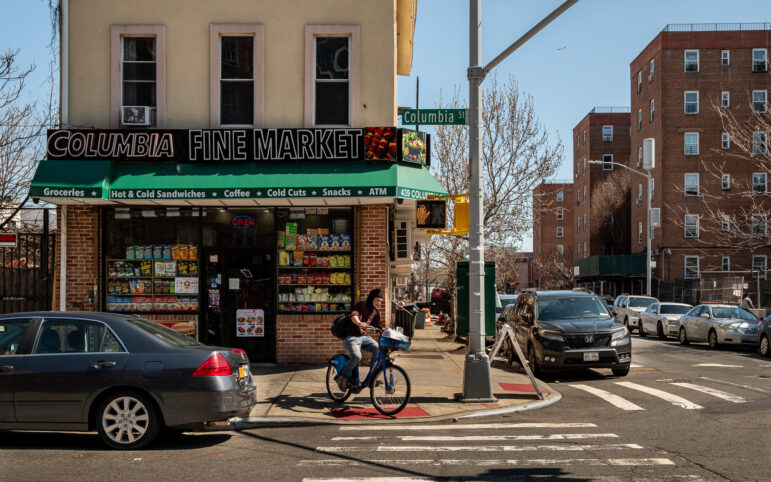
Adi Talwar
The Columbia Fine Market on Columbia Street, one of the few places residents of NYCHA’s Red Hook East and West Houses can go for hot cooked food in their neighborhood.And in March, his team helped Winn file an HP action to legally demonstrate why she plans to withhold her rent starting in May.
During an inspection, HPD noted conditions like a leak above her shower and walls with water damage, in addition to the stove without gas.
“I feel unsafe here,” Winn said. “If they charge me back rent, I’m going to fight in court not to pay it.”
Meanwhile, the NYCHA Utility Accountability Act, a bill sponsored by Brooklyn Assemblymember Marcela Mitaynes, would lower the cost of rent for NYCHA tenants who are impacted by such outages.
NYCHA would pay an affected tenant up to $75 per month or 10 percent of their daily rent—whichever is greater. These payments would be prorated based on the number of days disruption occurred.
Mitaynes, whose district includes Red Hook Houses, said in a statement that the ongoing outage is “unfortunately nothing new.”
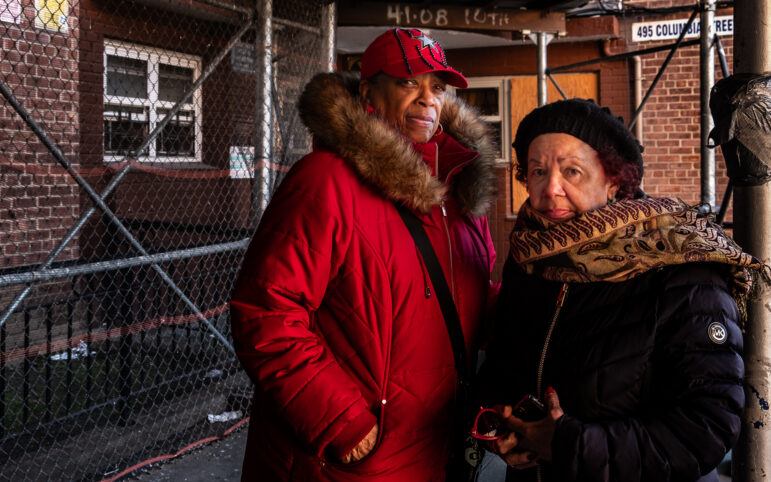
Adi Talwar
Andrea McKnight, 76, with her neighbor Carmen Rodriguez at the entrance of their building.“With this new rule in place, delaying infrastructural repairs will no longer be the cheaper option for the NYCHA administration,” she added.
McKnight, who plans to continue paying rent, said she would still like to be credited for the outage.
“Gas, light… that’s included in the rent,” said McKnight. “We don’t have that gas now, they have to reimburse us or something.”
To reach the reporter behind this story, contact Tatyana@citylimits.org. To reach the editor, contact Emma@citylimits.org.
*Correction: An earlier version of this story misspelled Sealey’s last name. City Limits regrets the error.
Want to republish this story? Find City Limits’ reprint policy here.








